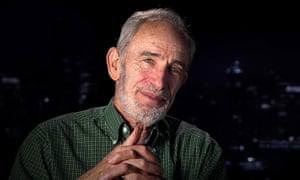Paul Ehrlich: 'Collapse of civilisation is a near certainty within decades'
Fifty years after the publication of his controversial book The Population Bomb, biologist Paul Ehrlich warns overpopulation and overconsumption are driving us over the edge
Ashattering collapse of civilisation is a "near certainty" in the next few decades due to humanity's continuing destruction of the natural world that sustains all life on Earth, according to biologist Prof Paul Ehrlich.
In May, it will be 50 years since the eminent biologist published his most famous and controversial book, The Population Bomb. But Ehrlich remains as outspoken as ever.
The world's optimum population is less than two billion people – 5.6 billion fewer than on the planet today, he argues, and there is an increasing toxification of the entire planet by synthetic chemicals that may be more dangerous to people and wildlife than climate change.
Ehrlich also says an unprecedented redistribution of wealth is needed to end the over-consumption of resources, but "the rich who now run the global system – that hold the annual 'world destroyer' meetings in Davos – are unlikely to let it happen".
The Population Bomb, written with his wife Anne Ehrlich in 1968, predicted "hundreds of millions of people are going to starve to death" in the 1970s – a fate that was avoided by the green revolution in intensive agriculture.
Many details and timings of events were wrong, Paul Ehrlich acknowledges today, but he says the book was correct overall.
"Population growth, along with over-consumption per capita, is driving civilisation over the edge: billions of people are now hungry or micronutrient malnourished, and climate disruption is killing people."
Ehrlich has been at Stanford University since 1959 and is also president of the Millennium Alliance for Humanity and the Biosphere, which works "to reduce the threat of a shattering collapse of civilisation".
"It is a near certainty in the next few decades, and the risk is increasing continually as long as perpetual growth of the human enterprise remains the goal of economic and political systems," he says. "As I've said many times, 'perpetual growth is the creed of the cancer cell'."
It is the combination of high population and high consumption by the rich that is destroying the natural world, he says. Research published by Ehrlich and colleagues in 2017 concluded that this is driving a sixth mass extinction of biodiversity, upon which civilisation depends for clean air, water and food.
The solutions are tough, he says. "To start, make modern contraception and back-up abortion available to all and give women full equal rights, pay and opportunities with men.
"I hope that would lead to a low enough total fertility rate that the needed shrinkage of population would follow. [But] it will take a very long time to humanely reduce total population to a size that is sustainable."
He estimates an optimum global population size at roughly 1.5 to two billion, "But the longer humanity pursues business as usual, the smaller the sustainable society is likely to prove to be. We're continuously harvesting the low-hanging fruit, for example by driving fisheries stocks to extinction."
Ehrlich is also concerned about chemical pollution, which has already reached the most remote corners of the globe. "The evidence we have is that toxics reduce the intelligence of children, and members of the first heavily influenced generation are now adults."
He treats this risk with characteristic dark humour: "The first empirical evidence we are dumbing down Homo sapiens were the Republican debates in the US 2016 presidential elections – and the resultant kakistocracy. On the other hand, toxification may solve the population problem, since sperm counts are plunging."
Reflecting five decades after the publication of The Population Bomb (which he wanted to be titled Population, Resources, and Environment), he says: "No scientist would hold exactly the same views after a half century of further experience, but Anne and I are still proud of our book." It helped start a worldwide debate on the impact of rising population that continues today, he says.
The book's strength, Ehrlich says, is that it was short, direct and basically correct. "Its weaknesses were not enough on overconsumption and equity issues. It needed more on women's rights, and explicit countering of racism – which I've spent much of my career and activism trying to counter.
"Too many rich people in the world is a major threat to the human future, and cultural and genetic diversity are great human resources."
Accusations that the book lent support to racist attitudes to population controlstill hurt today, Ehrlich says. "Having been a co-inventor of the sit-in to desegregate restaurants in Lawrence, Kansas in the 1950s and having published books and articles on the biological ridiculousness of racism, those accusations continue to annoy me."
But, he says: "You can't let the possibility that ignorant people will interpret your ideas as racist keep you from discussing critical issues honestly."
More of Paul and Anne Ehrlich's reflections on their book are published in The Population Bomb Revisited.









No comments:
Post a Comment